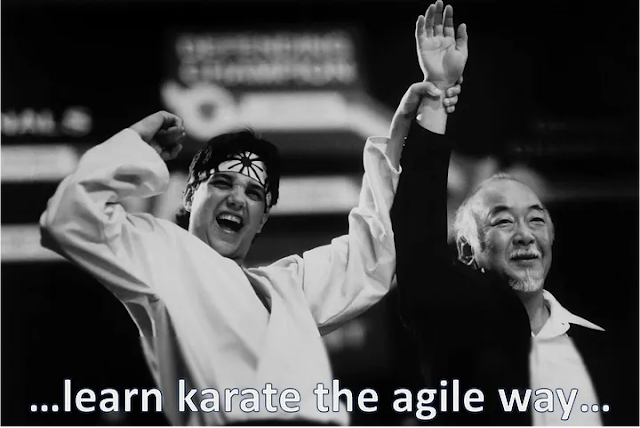“The Karate Kid” is a classic movie that has captivated audiences for decades with its inspiring story of dedication, determination, mentorship and personal growth. While it may seem unrelated to the world of Agile, the film easily aligns with the values and principles of the Agile mindset.
This article explores how “The Karate Kid” highlights key Agile values such as collaboration, continuous improvement, adaptability and resilience, showcasing how these principles can be applied in various aspects of life and work.
Collaboration and Teamwork:
In “The Karate Kid” the relationship between Daniel LaRusso and his mentor, Mr. Miyagi, exemplifies the importance of collaboration and teamwork. Mr. Miyagi serves as a guide and coach, providing Daniel with the tools and knowledge to succeed.
Similarly, the Agile mindset emphasizes in collaboration and teamwork to achieve shared goals. Agile teams work together, leveraging each other’s strengths and knowledge to deliver high-quality results.
Continuous Improvement:
A central theme in the movie is the concept of continuous improvement. As Daniel trains in karate, he faces numerous setbacks and challenges. However, through dedication and perseverance, he consistently works to refine his skills and grow as a martial artist.
This mirrors the Agile principle of continuous improvement, where individuals and teams regularly reflect on their performance, identify areas for enhancement and implement changes to achieve better outcomes.
Adaptability and flexibility:
“The Karate Kid” demonstrates the importance of adaptability and flexibility. Daniel encounters formidable opponents and confronts various obstacles throughout his journey. He must adapt his strategies and techniques to overcome these challenges.
Agile methodologies similarly emphasize adaptability and resilience, as teams must be flexible and responsive to changing requirements and circumstances.
Empowering Mentors and Coaching:
Mr. Miyagi’s role as a mentor and coach in “The Karate Kid” underscores the significance of guidance and support in personal and professional growth. Mr. Miyagi provides Daniel not only with technical skills but also with valuable life lessons.
Agile methodologies similarly encourage the role of mentors and coaches who support team members in their development, provide guidance and foster a culture of learning.
Iterative Learning and Practice:
“The Karate Kid” showcases the value of iterative learning and practice. Daniel starts with basic techniques and gradually builds upon them, refining his skills through repetitive practice.
Similarly, the Agile approach is to break down complex tasks into smaller, manageable increments and continuously iterate on them to achieve mastery.
Embracing Feedback:
Throughout the movie, Mr. Miyagi provides Daniel with constructive feedback, helping him identify areas for improvement. Daniel embraces this feedback and uses it to refine his techniques.
Agile methodologies also emphasize the importance of feedback loops, allowing teams to learn from each iteration, adapt their approach and continuously improve.
“The Karate Kid” movie serves as a source of inspiration for understanding the values of the Agile mindset. Through collaboration, continuous improvement, adaptability and flexibility, the film demonstrates how these principles can be applied to various aspects of life and work.
Whether it is in a martial arts tournament or an Agile project, the values showcased in “The Karate Kid” encourage individuals and teams to strive for excellence, embrace challenges and continuously grow to achieve their full potential…and eventually become champions and get the love of their life!



.jpg)
